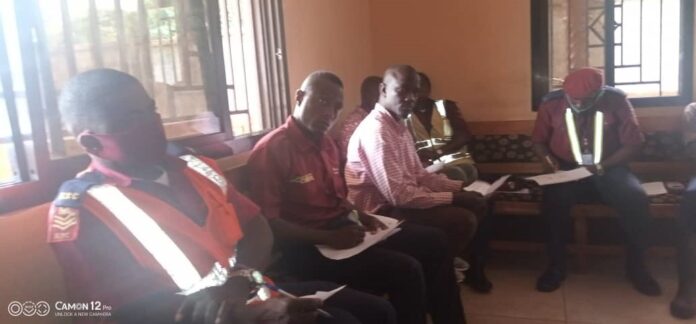The Public Education team of the Anti-Corruption Commission (ACC) in the North-West Regional office has on Wednesday 9th September 2020 engaged staff of the Sierra Leone Road Safety Authority (SLRSA) in Kambia on various issues bothering on corruption and also solicited their support in the fight against bribery.
Welcoming the ACC team, the Acting Head of Station of SLRSA in Kambia, Ibrahim T. Sarto described the meeting as timely and appropriate particularly when he was just coming in as the new Head of Station. He expressed firm conviction that the meeting would help guide their conduct and operation and also build on their existing knowledge on corruption.
In an interactive meeting, the Regional Manager in his statement informed the Road Safety Corps of the presence of the ACC in the region with a regional office located in Port Loko City to lead the fight against corruption and to put in place anti-corruption measures to address graft and bribery.
He explained related corruption offences and warned them in very strong terms to desist from those corrupt practices or face the full force of the law. Staff of the authority were also educated on key highlights of the 2019 Amendment Act of the ACC. Manager Sesayemphasised that the amendment laws have made corruption a very expensive and risky venture to undertake. He cautioned them to be mindful of the law and their interaction with the public, citing a video that went viral on social media wherein a Road Safety Corp was filmed receiving bribe from a tricycle rider. He noted that in the line of duty, the SLRSA officers are liable to face public resistance particularly when enforcing the law and enhancing road safety guidelines and precautions.
Public Education Officer Mohamed Thullah encouraged personnel to maintain high ethical standards and to be mindful of the ACC laws, adding that with the presence of the ACC in the region it will no longer be business as usual. He accentuated corrupt issues prevalent in the traffic sector particularly in checkpoints, pointing to a perverse system of extortion from the public.
He highlighted various methods of reporting corrupt practices to the ACC and encouraged them to resist and reject demands of corruption.
A question and answer session and the presentation of IEC materials on corruption formed part of the engagement.






































